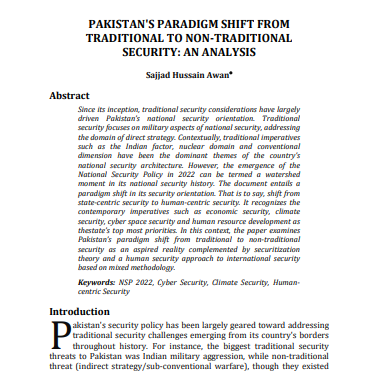PAKISTAN'S PARADIGM SHIFT FROM TRADITIONAL TO NON-TRADITIONAL SECURITY: AN ANALYSIS
DOI:
https://doi.org/10.54690/jcs.v12i2.260Keywords:
NSP 2022, Cyber Security, Climate Security, Human centric SecurityAbstract
Since its inception, traditional security considerations have largely driven Pakistan’s national security orientation. Traditional security focuses on military aspects of national security, addressing the domain of direct strategy. Contextually, traditional imperatives such as the Indian factor, nuclear domain and conventional dimension have been the dominant themes of the country’s national security architecture. However, the emergence of the National Security Policy in 2022 can be termed a watershed moment in its national security history. The document entails a paradigm shift in its security orientation. That is to say, shift from state-centric security to human-centric security. It recognizes the contemporary imperatives such as economic security, climate security, cyber space security and human resource development as the state’s top most priorities. In this context, the paper examines Pakistan’s paradigm shift from traditional to non-traditional security as an aspired reality complemented by securitization theory and a human security approach to international security based on mixed methodology.

Downloads
Published
How to Cite
Issue
Section
License
Copyright (c) 2024 Journal of Contemporary Studies

This work is licensed under a Creative Commons Attribution-NonCommercial 4.0 International License.
License Terms








